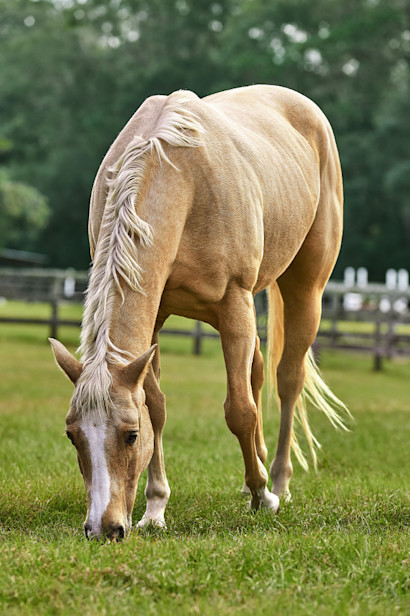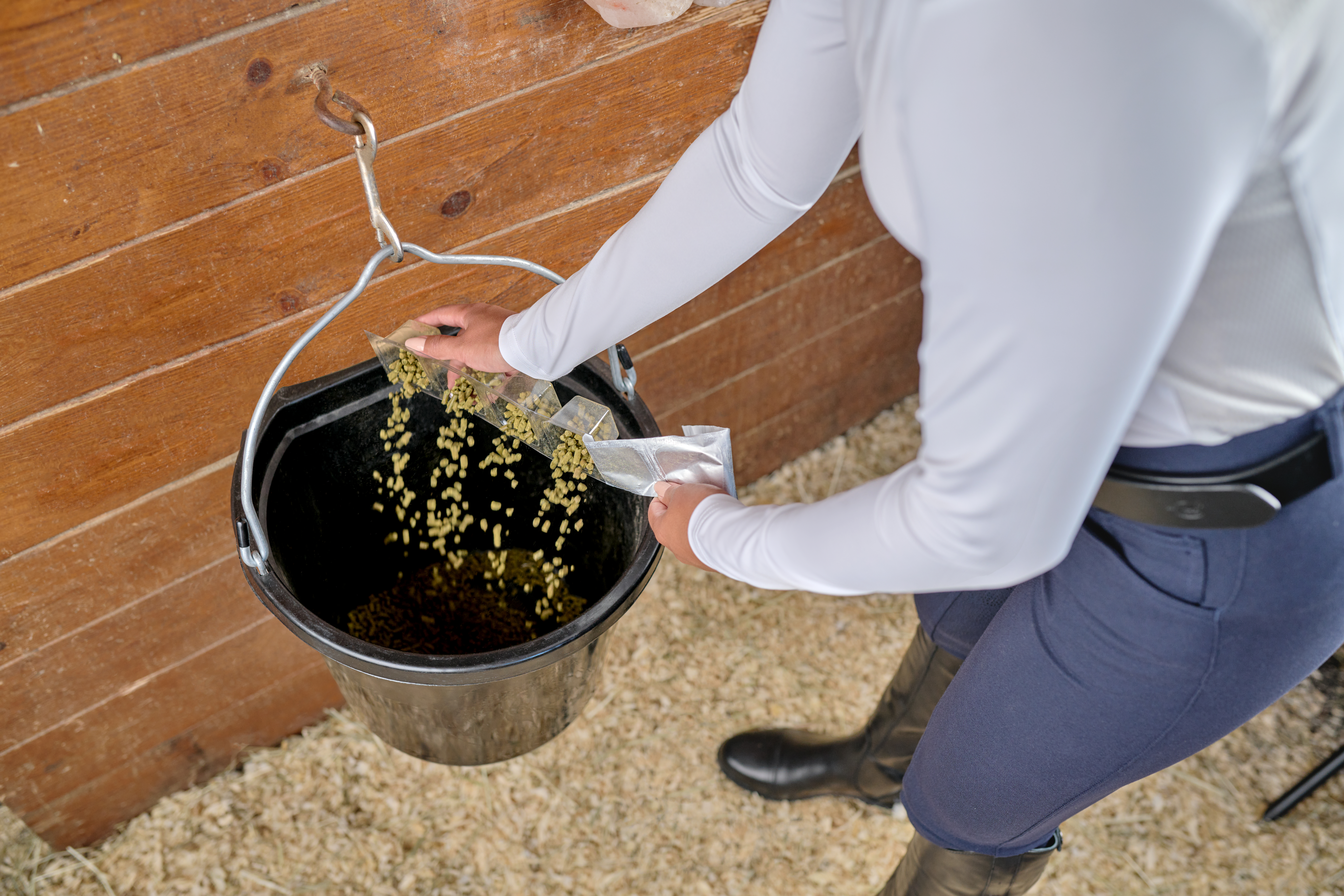Is Your Horse Missing Out on Vitamins, Minerals, & Protein?
Updated February 14, 2024

Vitamins, minerals, and protein are important components of your horse’s diet. At a minimum, your horse needs these nutrients to support the normal functioning of major body systems and prevent disease.
Understanding Vitamin, Mineral and Protein Needs for Horses
- Vitamins: Organic compounds needed in small amounts in your horse’s diet. Vitamins can be fat soluble (vitamins A, D, E, and K) or water soluble (vitamin C and B vitamins). Some may be produced within the body, while other vitamins must be supplied by food sources.
- Minerals: Inorganic compounds that must be provided in your horse’s diet. There are two categories of minerals: macrominerals that’re required in larger amounts (like calcium and phosphorus), and micro or trace minerals that’re required in smaller amounts (such as selenium).
- Protein: Made of amino acids, many of which must be derived from your horse’s diet. Protein requirements change depending on whether your horse is young and growing, lightly or heavily exercised, breeding, or retired.
Depending on how much and what type of forage and grain your horse is receiving, her diet may be coming up short on these three categories of nutrients. If your horse isn’t receiving her daily nutrient requirements, she may have:
- low energy or act spooky
- a dull coat
- poor hoof health
- take a long time to recover from exercise or stressful events like shipping
Optimal levels of nutrients allow your horse to thrive by supporting tissue health, immunity, and proper function of major bodily systems. The best way to find out exactly what your horse is getting (and what she’s missing) is to work with an equine vet and nutritionist who can analyze her unique diet and make recommendations based on the results.
Here are some general considerations for balancing your horse’s nutrition with vitamins, minerals, and protein depending on the quality of forage and amount of grain she’s fed.
Fulfilling Your Horse’s Daily Nutrient Requirements

While your horse’s forage supplies some protein, vitamins, and minerals, it’s likely not enough to fulfill her daily requirements. You can do a hay analysis or forage testing to find out. Depending on the results, you may want to complement her forage with a:
- Ration Balancer: Contains vitamins, minerals, and protein while typically being lower in calories than fortified grains.
- Forage Balancer: A supplement designed to correct common nutritional imbalances in hay or grass.
- Vitamin and Mineral Supplement: Provides a selection of key vitamins and minerals to help meet your horse’s nutrient requirements and promote overall health.
Considerations for Horses Who Are NOT Fed Grain
- If your horse’s pasture and/or hay has a high nutrient content, her protein needs may be fully covered by her forage. In this case, you may only need to add a vitamin and mineral supplement or forage balancer to ensure her diet is complete.
- If your horse’s pasture and/or hay come up short on protein supplies, you should opt for a ration balancer in addition to her daily forage. Ration balancers supply the same key vitamins and minerals as a vitamin and mineral supplement, plus enough protein to help meet your horse’s daily requirements when fed at the recommended serving.
Unlike fortified grains, neither vitamin and mineral supplements nor ration balancers contain a significant source of calories. This makes both options a great choice for easy keepers and other horses who should avoid grain. However, as with fortified grains, the balancer may be balanced to itself and may meet the minimums for essential minerals, but it may not address imbalances in the forage which can interfere with absorption.
Considerations for Horses Who ARE Fed Grain

To round out your horse’s nutrition, consider the amount of grain in addition to hay you’re feeding. Start evaluating your horse’s current serving of grain by reading the label on her feed bag.
- If your horse is receiving a handful of grain, you can skip back up to the section for horses on no grain at all, since any vitamins, minerals, and protein received would be in negligible amounts.
- If your horse is receiving a partial serving of grain, she’s also only getting a partial serving of vitamins and minerals. As a result, consider adding a vitamin and mineral supplement to help ensure her diet is complete.
- If your horse is receiving a full serving of grain, her protein, vitamin, and mineral needs may be met (at least for individual requirements) if it is a high-quality product. Fortified grains vary in their inclusion rates and do not compensate for imbalances in forage.
Coming Up Short is Common
We surveyed horse owners and found that 7 out of 10 horses are not receiving a full serving of grain. This isn’t necessarily a bad thing, as many horses don’t need grain to maintain their body condition. However, if your horse is in that majority, it’s up to you to fill that nutritional gap.
Additional Horse Owner Resources
- Watch this video to learn about the differences between a ration balancer and vitamin mineral supplements.
- Learn how complete feeds and ration balancers differ as feed sources.